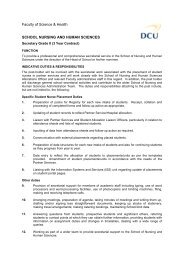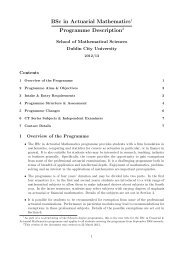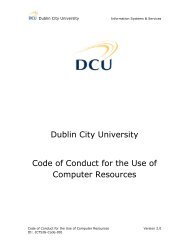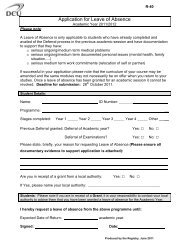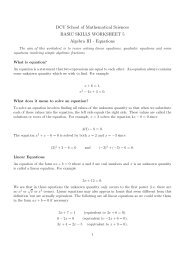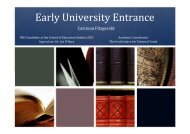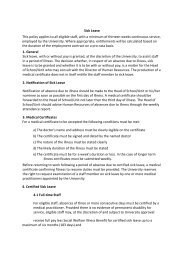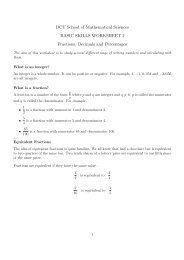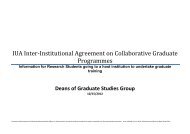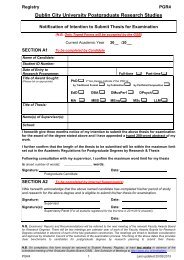Dublin City University Postgraduate Programmes 2012 - DCU
Dublin City University Postgraduate Programmes 2012 - DCU
Dublin City University Postgraduate Programmes 2012 - DCU
You also want an ePaper? Increase the reach of your titles
YUMPU automatically turns print PDFs into web optimized ePapers that Google loves.
5<br />
<strong>Postgraduate</strong> Research <strong>Programmes</strong><br />
Candidates for a higher degree by research follow a directed<br />
programme of research for a prescribed period. This period will<br />
vary depending on the degree, on whether the candidate is<br />
studying on a full-time or a part-time basis and, in some instances,<br />
on the classification and content of their first degree. Provision<br />
also exists for research to be undertaken wholly or partly outside<br />
the <strong>University</strong> provided that suitable facilities and satisfactory<br />
joint supervision are available.<br />
Candidates for a higher degree by research will be assessed<br />
on the basis of a written thesis and an oral examination.<br />
<strong>Postgraduate</strong> Research Degree Titles<br />
The postgraduate degrees awarded by the <strong>University</strong> following<br />
successful completion of a directed programme of research are:<br />
MA – Master of Arts<br />
M.B.S. – Master of Business Studies<br />
M.Eng. – Master of Engineering<br />
M.Sc. – Master of Science<br />
LL.M. – Master of Laws<br />
Ph.D. – Doctor of Philosophy<br />
DBA – Doctor of Business Administration<br />
Ed.D. - Doctor of Education<br />
DPsych - Doctorate in Psychotherapy<br />
DMusPerf - Doctorate of Music in Performance<br />
Entry Requirements<br />
To be eligible for admission to a postgraduate degree programme<br />
by research, a candidate must normally have obtained a primary<br />
degree classification, equivalent to Second Class Honours Grade<br />
2, from a recognised university or degree-awarding body, or have<br />
an approved equivalent professional qualification. Initially, all<br />
such candidates will be registered for a Masters degree under the<br />
supervision of the academic staff of the <strong>University</strong>. Those who<br />
wish to complete a Ph.D. can transfer from the Masters register to<br />
the Ph.D. register subject to satisfactory assessment and approval.<br />
Candidates with a primary degree in an appropriate discipline<br />
with First- or Second Class Honours Grade 1 and candidates<br />
with a taught Masters degree in an appropriate discipline with<br />
First or Second Class Honours may apply and be considered for<br />
direct entry to the Ph.D.-track register and proceed towards a<br />
Ph.D. degree, subject to satisfactory performance as certified<br />
by the Internal Supervisor and another Internal Examiner. Such<br />
candidates will have to undergo a confirmation procedure not<br />
later than the second year of research for full-time students<br />
(and at an appropriate corresponding time for part-time students).<br />
This confirmation procedure should be similar to the current<br />
transfer procedure from Masters to Ph.D. register. If the outcome<br />
of the confirmation procedure is unsuccessful the student may,<br />
if appropriate, be invited to complete such research as will allow<br />
him/her to graduate with a Masters degree.<br />
In exceptional circumstances only, candidates who do not meet<br />
the stipulated entry requirements but who can demonstrate<br />
exceptional ability or aptitude for academic research may apply<br />
to pursue studies for a higher degree. Such candidates, if accepted<br />
by Academic Council, will be required initially to successfully<br />
complete a Masters Qualifying Examination. Candidates are<br />
advised that this process is rarely used.<br />
Candidates holding a Masters degree by research may apply<br />
directly for a Ph.D. degree in a cognate area and be admitted<br />
directly to the Ph.D. register provided the proposed programme<br />
of research is sufficiently distinct from the programme of research<br />
for which the Masters degree has been awarded, and provided an<br />
appropriately qualified member of the <strong>University</strong>’s academic staff<br />
is willing to act as research supervisor.<br />
The Degree of Masters (by Research and Thesis) is of Honours<br />
standard and is awarded without classification. The Degree of<br />
Doctor of Philosophy is awarded without classification.<br />
<strong>Postgraduate</strong> <strong>Programmes</strong><br />
Application to transfer from the Masters register to the Ph.D.<br />
register may not normally be made less than one year from the<br />
Masters registration date. In determining whether or not such<br />
a transfer shall take place, Academic Council will require evidence<br />
that the candidate’s progress to date has been satisfactory and<br />
that the programme of research envisaged provides a satisfactory<br />
basis for work at Ph.D. level. Candidates transferred to the Ph.D.<br />
register will be granted appropriate retrospection, normally to<br />
the date of original registration.<br />
Candidates who are admitted to the Ph.D. register in this way<br />
are free to use the results of their research while on the Masters<br />
register provided it has not been submitted as part of an<br />
assessment for another degree at this or any other university.




